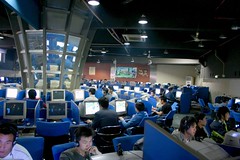Chinese People and their Mobile Phones: SMS
As in most Western countries, mobile phones are also very popular in China, among all different age groups and walks of life -- sometimes seen in very unusual places. The contrast between China and other Western countries shows up in the -- astronomical -- numbers: up to 1997, there was little over 10 million mobile phone service subscriptions... today, there are more than 400 million.
Even more impressive is use of short messages (SMS): just in the first 10 months of 2005, there were more than 260 billion. Short messages are so popular that such demand pushes the industry into creating a myriad of services based on systems that automatically answer messages sent through SMS from costumers: for example, in big cities like Shanghai, one can check the Yellow Pages through SMS, make restaurant reservations through SMS, and so on.















Even more impressive is use of short messages (SMS): just in the first 10 months of 2005, there were more than 260 billion. Short messages are so popular that such demand pushes the industry into creating a myriad of services based on systems that automatically answer messages sent through SMS from costumers: for example, in big cities like Shanghai, one can check the Yellow Pages through SMS, make restaurant reservations through SMS, and so on.
UPDATE: I'm moving this blog to http://designative.info















